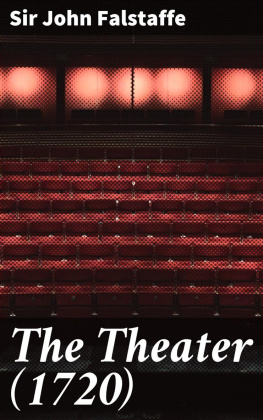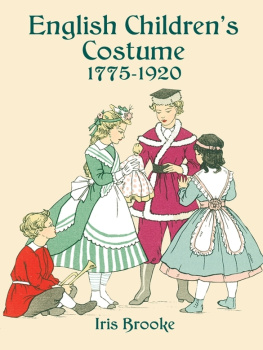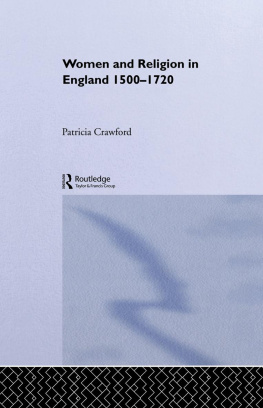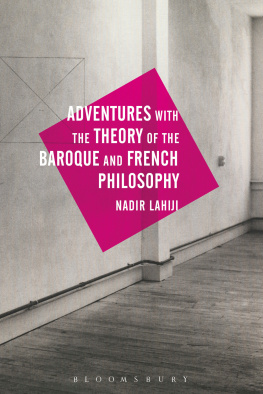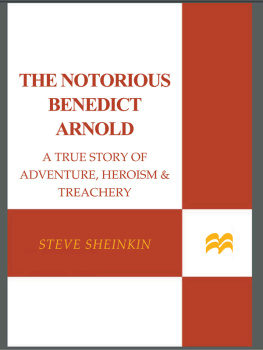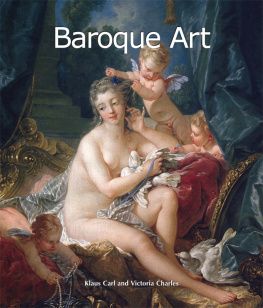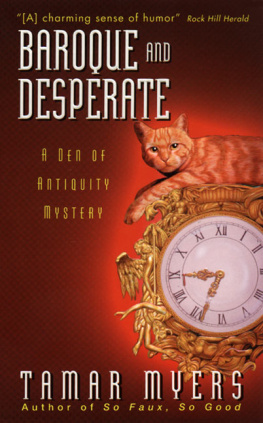Radandt Friedhelm - From Baroque to Storm and Stress 1720-1775
Here you can read online Radandt Friedhelm - From Baroque to Storm and Stress 1720-1775 full text of the book (entire story) in english for free. Download pdf and epub, get meaning, cover and reviews about this ebook. year: 1977, publisher: Taylor & Francis Group, genre: Science. Description of the work, (preface) as well as reviews are available. Best literature library LitArk.com created for fans of good reading and offers a wide selection of genres:
Romance novel
Science fiction
Adventure
Detective
Science
History
Home and family
Prose
Art
Politics
Computer
Non-fiction
Religion
Business
Children
Humor
Choose a favorite category and find really read worthwhile books. Enjoy immersion in the world of imagination, feel the emotions of the characters or learn something new for yourself, make an fascinating discovery.

- Book:From Baroque to Storm and Stress 1720-1775
- Author:
- Publisher:Taylor & Francis Group
- Genre:
- Year:1977
- Rating:4 / 5
- Favourites:Add to favourites
- Your mark:
- 80
- 1
- 2
- 3
- 4
- 5
From Baroque to Storm and Stress 1720-1775: summary, description and annotation
We offer to read an annotation, description, summary or preface (depends on what the author of the book "From Baroque to Storm and Stress 1720-1775" wrote himself). If you haven't found the necessary information about the book — write in the comments, we will try to find it.
From Baroque to Storm and Stress 1720-1775 — read online for free the complete book (whole text) full work
Below is the text of the book, divided by pages. System saving the place of the last page read, allows you to conveniently read the book "From Baroque to Storm and Stress 1720-1775" online for free, without having to search again every time where you left off. Put a bookmark, and you can go to the page where you finished reading at any time.
Font size:
Interval:
Bookmark:
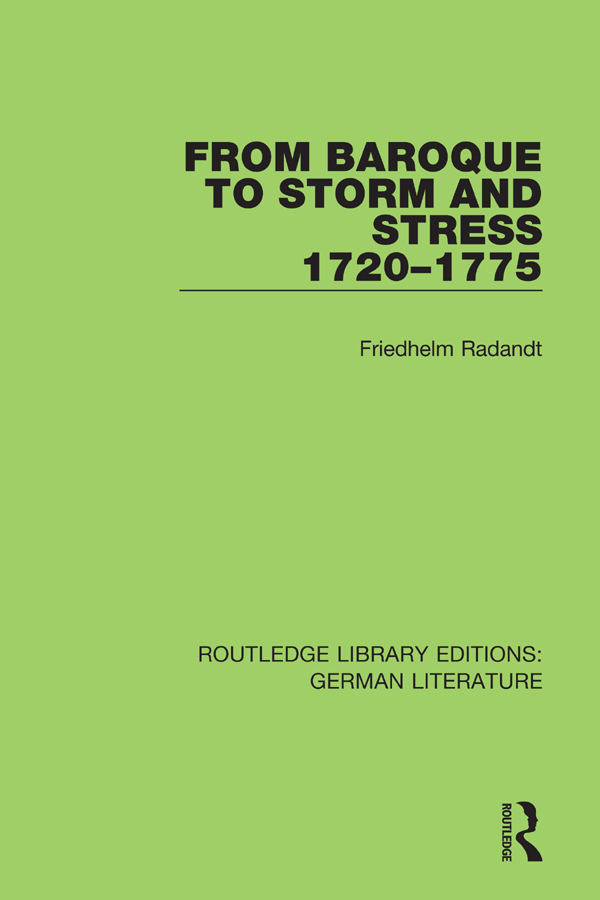
Volume 25
FROM BAROQUE TO STORM AND STRESS 17201775
FRIEDHELM RADANDT

First published in 1977 by Croom Helm Ltd
This edition first published in 2020
by Routledge
2 Park Square, Milton Park, Abingdon, Oxon OX14 4RN
and by Routledge
52 Vanderbilt Avenue, New York, NY 10017
Routledge is an imprint of the Taylor & Francis Group, an informa business
1977 Friedhelm Radandt
All rights reserved. No part of this book may be reprinted or reproduced or utilised in any form or by any electronic, mechanical, or other means, now known or hereafter invented, including photocopying and recording, or in any information storage or retrieval system, without permission in writing from the publishers.
Trademark notice: Product or corporate names may be trademarks or registered trademarks, and are used only for identification and explanation without intent to infringe.
British Library Cataloguing in Publication Data
A catalogue record for this book is available from the British Library
ISBN: 978-0-367-41588-4 (Set)
ISBN: 978-1-00-301460-7 (Set) (ebk)
ISBN: 978-0-367-85644-1 (Volume 25) (hbk)
ISBN: 978-1-00-301415-7 (Volume 25) (ebk)
Publishers Note
The publisher has gone to great lengths to ensure the quality of this reprint but points out that some imperfections in the original copies may be apparent.
Disclaimer
The publisher has made every effort to trace copyright holders and would welcome correspondence from those they have been unable to trace.
1977 Friedhelm Radandt
Croom Helm Ltd, 210 St Johns Road, London SW11
ISBN 0-85664-351-3
Published in the U.S.A. 1977 by
HARPER & ROW PUBLISHERS, INC.
BARNES & NOBLE IMPORT DIVISION
ISBN 0-06-495760-8
LC 76-42159
Printed in Great Britain by Biddles Ltd, Guildford, Surrey
I should like to thank here Dr George J. Metcalf, University of Chicago, and Professor Vincent R. Kling, Lake Forest College, for their careful reading of the manuscript in its early stages. Their thoughtful and detailed suggestions brought about many improvements in the text and in the presentation of the material. I am grateful too to the general editors of the series, Dr R. T. Llewellyn, Christs College, Cambridge, and Professor Kenneth J. Northcott, University of Chicago, for their critical comments from the perspective of the entire series. Several revisions and additions, most of them completed early in 1976, go back to their questions and comments.
Lake Forest, Illinois
April 1976
F. K. Radandt
DLEDeutsche Literatur in EntwicklungsreihenDNLDeutsche National-LiteraturDUDeutschunterrichtDVLGDeutsche Vierteljahresschrift fr Literatur- und GeistesgeschichteEdLEpochen der deutschen LyrikGLLGerman Life and LettersGQGerman QuarterlyGRGermanic ReviewGRMGermanisch-Romanische MonatsschriftJEGPJournal of English and Germanic PhilologyLYLessing YearbookMLNModern Language NotesMLQModern Language QuarterlyMLRModern Language ReviewPMLAPeriodical of the Modern Language AssociationZDPZeitschrift fr deutsche PhilologieZfdAZeitschrift fr deutsches AltertumDespite the ambiguity of the terms Enlightenment and Aufklrung as labels designating a cultural epoch of the eighteenth century, their widespread use suggests that they are still serviceable. Cultural historians have used these words to describe the period that began with the lawyer, philosopher and pedagogue Christian Thomasius in the 1680s and which reached its peak with the popularity of Christian Wolff in the 1730s and 1740s. The literary Enlightenment in Germany produced its first works in the 1720s, when Brockes published his collection of poems entitled Irdisches Vergngen in GOtt, and achieved its greatest impact by the dominance of such influential authors as Wieland and Lessing from the 1750s to the 1770s. In a narrow sense, the Enlightenment encompasses those figures in the eighteenth century who acknowledged the autonomy of reason, and hence of the individual, and who sought to apply reason to all areas of human existence by using literature didactically, with a view to educating as many people as possible. But Enlightenment is also a designation for the entire age, an age which was as little uniform in its goals and beliefs as any other.
The term Enlightenment is frequently equated with a strict and exclusive rationalism. Yet it is well to remember that Pietism, so often presented merely as fervent religious enthusiasm, was indeed a significant and representative cultural force throughout the period and an integral part of the philosophical age. Philip Jakob Spener (16351705) had started the Pietistic movement just before the turn of the century, and August Hermann Francke (16621727) developed its social and educational institutions in Halle. But it was Count Nikolaus von Zinzendorf (17001760) he offered the Moravian Brethren refuge on his estate near Leipzig and thus founded the Herrenhuter Brdergemeinde whose brand of Pietism had the strongest and most lasting effect on the eighteenth century, ethically, psychologically, and aesthetically. To a degree Enlightenment philosophy and Pietism pursue similar aims. Both have a strong desire to educate; both provide an important impetus to the emergence of an intellectually independent middle-class society; both are essentially Protestant in nature and allegiance and therefore particularly strong in the northern parts of Germany as well as in German-speaking Switzerland; both disagree with theologically orthodox dogmatism; both strive for clarity in the German language and both accentuate the absoluteness of strict moral and ethical codes. Thought and feeling are not such mutually exclusive regions in the eighteenth century as they are often said to be. Thomasius, referred to by many as the father of the German Enlightenment, was not only a rationalistic philosopher, but, at least at times, also a devout Pietist. This same blend of rationalistic and sentimental tendencies is noticeable in a number of writers of the age, in Brockes, Haller, Gellert, and Wieland, to name only a few.
Enlightenment does not only pertain to a historical period in the eighteenth century; its practitioners viewed it above all as a mental attitude or outlook on life. The influential bookseller and philosophical author Friedrich Nicolai (17331811), who helped make Berlin a center of Enlightenment culture, talks about this attitude in his novel Das Leben und die Meinungen des Herrn Magister Sebaldus Nothanker (17731776). The Leipzig bookdealer Hieronymus, one of the novels minor characters, finds confirmation of the spread of Enlightenment attitudes in the fact that fewer worthless books were sold: Ich liebe die Aufklrung des menschlichen Geschlechts; sie fngt auch an, sich bei uns zu zeigen.... Ich merke seit einiger Zeit, dass in meiner Vaterstadt verschiedene schlechte Bcher, die ich sonst oft verkauft habe, liegenbleiben, und freue mich darber. Such a viewpoint underscores the fact that rationalists and Pietists were, indeed, contemporaries, but ones with very different values and priorities, which often enough caused tension between them.
The Pietists did not acknowledge the autonomy of reason, and that issue prompted them to force Wolffs expulsion as a university professor from Halle in 1723, when the dominance of Pietism in that city was strongest. This action pointed up the irreconcilable nature of the conflict between the German Enlightenment philosophy with its deistic trends on the one hand, and the Pietistic movement with its emphasis on personal divine illumination on the other, in spite of any aims which they had in common. The most pronounced feature of the German Enlightenment philosophically was its preoccupation with theological issues, especially its attempt to formulate its concept of God. The desire to prove the greatness of God was a dominating motif in Leibnizs and Wolffs philosophy. The correlative to this theological concern is their avowed aim to instill in the individual person a sense of moral responsibility. As rationalists they relied on reason to formulate moral principles, whereas the Pietists derived those principles from divine revelation.
Next pageFont size:
Interval:
Bookmark:
Similar books «From Baroque to Storm and Stress 1720-1775»
Look at similar books to From Baroque to Storm and Stress 1720-1775. We have selected literature similar in name and meaning in the hope of providing readers with more options to find new, interesting, not yet read works.
Discussion, reviews of the book From Baroque to Storm and Stress 1720-1775 and just readers' own opinions. Leave your comments, write what you think about the work, its meaning or the main characters. Specify what exactly you liked and what you didn't like, and why you think so.

